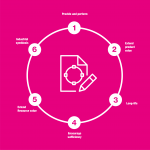Total Quality Management (TQM) is a structured system for satisfying internal and external customers and suppliers by integrating the business environment, continuous improvement, and breakthroughs with development, improvement, and maintenance cycles while changing organizational culture. TQM aims for quality principles to be applied broadly throughout an organization or set of business processes. Total Quality Management (TQM) programs focus on improvement in individual operations with unrelated processes; as a consequence, it takes many years before all operations within a given process are improved. Six Sigma focuses on making improvements in all operations within a process that produce results more rapidly and effectively.
The Six Sigma’s Breakthrough Strategy is a disciplined method of using extremely rigorous data-gathering and statistical analysis to pinpoint sources of errors and ways of eliminating them. Six Sigma relies on the voice of the consumer to set the standard of acceptable performance. Six Sigma has a systematic approach to both validate data and to focus on the critical few inputs that will have the greatest potential to effect meaningful improvement.
Six Sigma focuses on reducing defects in management and clinical process; it uses statistical analysis to find the most defective part of the process, and rigorous control procedures to sustain improvement.
While Six Sigma is a long-term strategy, it is designed to generate immediate improvements to profit margins too. Compared to traditional quality management programs such as TQM that project three or more years into the future, Six Sigma focuses on achieving financial targets in twelve-month increments.
TQM and Six Sigma have a number of similarities including the following:
1. A customer orientation and focus
2. A process view of work
3. A continuous improvement mindset
4. A goal of improving all aspects and functions of the organizations
5. Data based decision-making
6. Benefits depend highly on effective implementation
A key difference between TQM and Six Sigma is that Six Sigma focuses on prioritizing and solving specific problems which are selected based on the strategic priorities of the company and the problems which are causing the most defects whereas TQM employs a more broad based application of quality measures to all of the company’s business processes. Another difference is that TQM tends to apply quality initiatives within specific departments whereas Six Sigma is cross-functional meaning that in penetrates every department, which is involved in a particular business process that is subject to a Six Sigma project.
Another difference TQM provides less methodology in terms of the deployment process whereas Six Sigma’s DMAIC framework provides a stronger platform for deployment and execution. For example, Six Sigma has a much stronger focus on measurement and statistics, which helps the company, define and achieve specific objectives. Six Sigma is complementary to TQM because it can help to prioritize issues within a broader TQM program and provides the DMAIC framework, which can be used to meet TQM objectives.
Conclusion
Both measurements of quality control within an organization have brought true success to companies who have applied their policies and procedures.
The leaders and management teams of any organization will have to evaluate which quality of control tactic is the most beneficial to the growth and improvements of their business.
The one way to analyze your business is to establish your goals and vision for your organization and set plans in place to evaluate if Six Sigma or Total Quality Management falls in the realms of what you are seeking.
Both processes have taken the best of the best countries and companies from good to great and I personally feel that as long as you have one of these processes in place, you are setting yourself up for success.
.

91,262 Comments
If some one wants expert view about running a blog after that i recommend him/her to pay
a visit this website, Keep up the fastidious job.
always i used to read smaller content that as well clear their motive, and that is also happening with this post which I am reading now.
Also visit my homepage; Forex trading without a broker
cost of generic tadalafil
Spot on with this write-up, I absolutely feel this site needs a lot more
attention. I’ll probably be back again to see more, thanks for the
info!
Every weekend i used to visit this site, for the reason that i wish for enjoyment,
for the reason that this this website conations actually good
funny material too.
synthroid generic
Hmm it appears like your website ate my first comment (it was super
long) so I guess I’ll just sum it up what I submitted and say,
I’m thoroughly enjoying your blog. I as well am an aspiring blog blogger but I’m still new to the whole
thing. Do you have any suggestions for novice blog writers?
I’d really appreciate it.
Hello, after reading this remarkable paragraph i am as well delighted to share my familiarity here with
colleagues.
my blog 분데스리가중계
“Nice work!”
cialis 40mg online australia
Whoa! This blog looks just like my old one! It’s on a totally
different topic but it has pretty much the same layout and design. Great choice of colors!